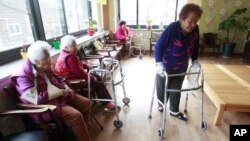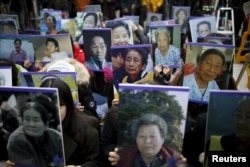South Korea and Japan held talks Tuesday to resolve the stalled implementation of last year's agreement to settle their decades-long dispute over Tokyo's wartime sexual enslavement of Korean women.
The foreign ministers from Japan and South Korea reached a breakthrough settlement in late December that included a written apology from Prime Minister Shinzo Abe and a pledge by Tokyo to provide $8.9 million for a foundation to be established by Seoul to support the surviving victims, known as "comfort women."
The settlement relieves Japan of any further responsibility and liability for all past wartime grievances.
The agreement
However the money has yet to be allocated and Tuesday’s meeting is the first time since the agreement that the two foreign ministries have gathered to work out any remaining differences.
“We are steadily working on preparation for the establishment of a foundation by closely discussing with the Ministry of Gender Equality and Family, which is the supporting institution for comfort women,” said South Korean Foreign Ministry spokesman Cho June-hyuck.
Statue controversy
In the settlement, Tokyo also asked that a “comfort woman” statue located across from the Japanese Embassy in Seoul be removed. The controversial statue was placed at the site where “comfort women” supporters have held a weekly protest rally for years demanding an official Japanese apology and restitution.
The funding delay has led to speculation that Tokyo is refusing to comply until Seoul removes the statue, even though both sides have denied it.
“In order to make us accept their denial, I think Japan should provide one billion yen to South Korea immediately so the foundation can be established, while still having the statue,” said Hosaka Yuji, a political science professor at Sejong University in Seoul who focuses on relations between Japan and Korea.
Comfort women opposition
Another reason for the delay in payment is that some of the surviving comfort women have vehemently and very publicly opposed the deal.
It is estimated that over 200,000 women throughout the Pacific region were forced into prostitution by the Japanese military during both WWII and Japan’s colonization of Asia.
In South Korea, only 44 survivors remain of the 238 women who came forward, and their average age is 89.
Some of them have been outspoken critics of both the Japanese prime minister and South Korean President Park Geun-hye for negotiating this deal on their behalf, but without their consent.
After the deal was announced, Lee Yong-soo spoke at a protest rally across from the Japanese Embassy in Seoul and condemned the agreement, saying the South Korean government was again capitulating to Japan.
“Why is our government trying to kill us twice and three times with Japan?” she said.
Missing accountability
Critics of the negotiated agreement say it lacks sincerity and official accountability.
Abe’s apology offered remorse for “immeasurable and painful experiences” but did not acknowledge the extent of official Japanese military involvement in the forced prostitution program, nor detailed the specific atrocities committed by the Japanese military.
And the agreement allows Japan to call the $8.9 million payment a contribution or donation, versus official compensation. That distinction, opponents say, reduces Japan’s legal responsibility for it past misconduct.
Other “comfort women” have publicly chastised South Korean officials who tried to explain President Park’s support for reaching the compromised settlement before the elderly victims pass away.
Also leaders from a group representing the victims, the Korean Council for the Women Drafted for Military Sexual Slavery by Japan, recently met with the United Nations Secretary-General Ban Ki-moon.
Ban Ki-moon, who is Korean, expressed sympathy for the victims, but he praised the agreement between South Korea and Japan when it was announced in December of last year.
The U.N. High Commissioner for Human Rights Zeid Hussein, however, has criticized the agreement, saying of the comfort women’s grievances that, “ultimately, only they can judge whether they have received genuine redress.”
Youmi Kim in Seoul contributed to this report.














